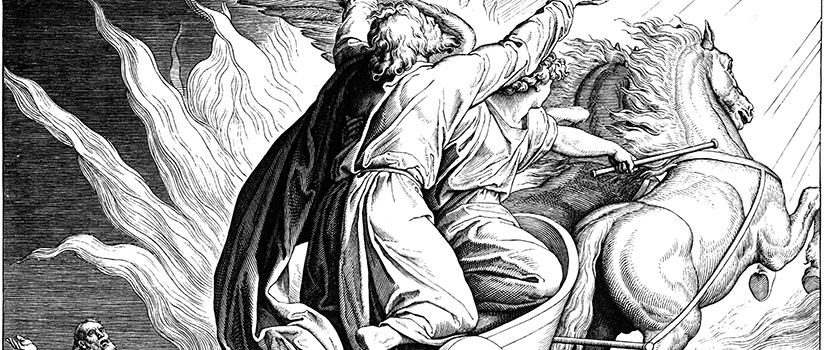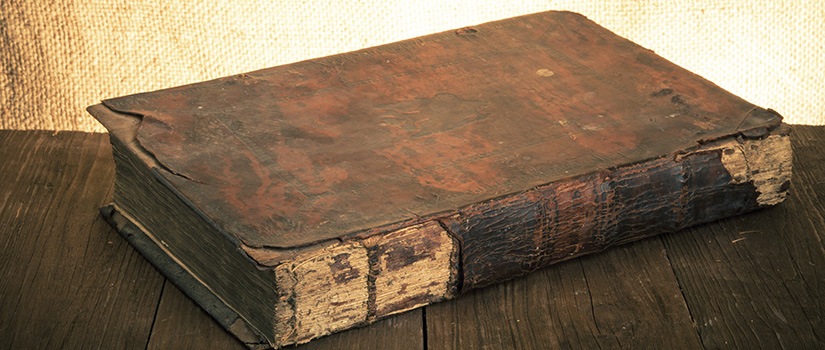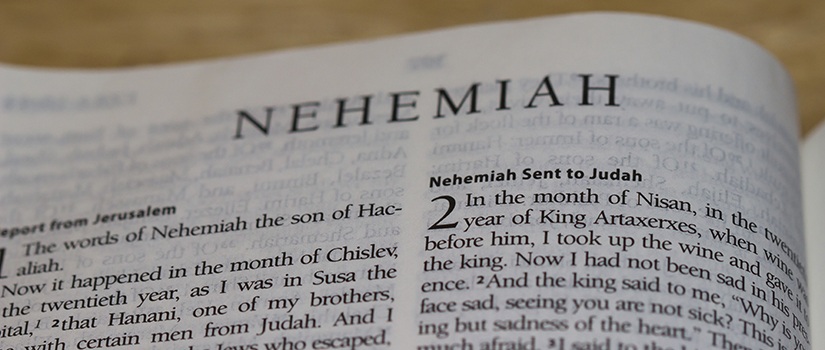Elijah’s Translation To Heaven, Page #1
2 Kings 2:1 “And it came to pass, when the LORD would take up Elijah into heaven by a whirlwind, that Elijah went with Elisha from Gilgal.”
—— Introduction: ——
With this sentence the author of Kings introduces us to one of the grandest events in human history, the translation of Elijah. As far as the history of man, as recorded for our learning, only two men have not tasted death, Enoch of the Antediluvian age, and Elijah of the Prophetic age. Each of the three great dispensations of religion has had its special illustrations of a literal ascension to glory.
In the Patriarchal age, Enoch, probably the best of the world’s old men was yet the shortest lived. His years were precisely as the days in a solar revolution, three hundred and sixty five. And having fulfilled a glorious life, “He walked with God; and was not; for God took him” (Genesis 5:23-24).
The scene on Olivet of our Lord represents the ascension, or translation, in the Christian age.
“He led them out as far as Bethany” and there, while the Eleven were gazing in rapt amazement, the Master rose, personally, visibly, triumphantly, till “a cloud received Him out of their sight.” (Luke 24:50-51; Acts 1:9-10)
God had said, “Dust thou art, and unto dust shalt thou return” (Genesis 3:19). Out of the ground was man’s body taken, and because of sin, unto the ground it shall return. More than three thousand years had passed since that sentence was pronounced against the fallen race, and Enoch had been the only person who was exempted from it. Why Enoch rather than Noah, Abraham, Moses, or Samuel should have been so honored we know not.
And now another was on the point of being transported bodily to heaven, but why such peculiar honor should be conferred upon Elijah rather than any other of the prophets we cannot say, and it is idle to speculate.
——-Contents——
1. Elijah’s Preparations For Departure 2. Elijah Has Finished His Course.
3. Directed By The Spirit Of The Lord. 4. Elisha Cleaves To Elijah.
5. A Farewell Visit. 6. A Parting Blessing.
7. Elijah Tries Elisha’s Fidelity Again. 8. And They Two Went on.
9. Proof of Elijah’s Translation.
~~~~~~~~~~~~~~~~~~~~~~~~~~~~~~~~~~~~~~~~~~~~~~~~~~~~~~~~~~
1. ELIJAH MAKES PREPARATIONS FOR DEPARTURE:
In this chapter (2 Kings 2) we have, that extraordinary event, the translation of Elijah. Elijah’s age is unknown. First we will take up his preparation for departure.
I thought how much time the Lord allows us to make preparations for our departure from this life is mostly unknown to us. The writer of Hebrews says, “It is appointed unto man once to die, and after this the Judgment” (Hebrews 9:27). If we knew the day or the hour we could be better prepared to meet it.
In the close of the last chapter we had a wicked king leaving the world in disgrace, here we have a holy prophet leaving it in honor; The departure of the former was his greatest misery, of the latter his greatest bliss: Men are as their end is.
We must note that some period of time would have passed between the time when Elijah pronounced the death sentence on Ahaziah (2 Kings 1:16), and his departure to heaven, maybe as many as seven years.
From the hints conveyed by the divine record in 2 Kings we gather that Elijah’s last days here on earth were not idle ones. While nothing spectacular and dramatic is recorded of that period, he was employed in doing what was good and useful.
It would seem that both he and Elisha, not only instructed the people in private, but also founded and superintended schools of the Prophets in various parts of the land. By training them to read and teach the Word Of God, those young men were prepared for ministry, and to carry on the work of reformation in Israel, just as our Lord did many centuries later with his Apostles which had more lasting fruit than the miracles He preformed before the multitudes.
2. Elijah Had Finished His Course:
Elijah had now almost finished his course. The time of his departure is at hand, and How Does He Occupy His Last Hours?
Does He ask for an assembling of Israel for His own glorification, as He once asked for the Glory of God (1 Kings 18:19)? Is there an invitation sent to Jehoram and the court with special mention to Jezebel that they may attend and see who is victor now? No; for were it possible, the Prophet would dispense with even Elisha’s presence. He desires no display, wishes no demonstration. In His closing hours His old love of solitude seems to return.
Let us follow His footsteps as He makes his last journeys on this His last days on earth, which ends outside the Promise Land and back in His home country not far from Tishbe.
2 Kings 2:1. And it came to pass, when the LORD would take up Elijah into heaven by a whirlwind, that Elijah went with Elisha from Gilgal.
This was known, not only by Elijah himself, and to Elisha, but even the sons of the prophets. By divine notification Elijah had received notice of the Lord’s intentions to give him a supernatural exit from this world.
The day begins with Elijah and Elisha in Gilgal, where no doubt one of the schools for prophets was located, and was a very sacred place in Jewish history. Gilgal marked the starting point of Elijah’s final journey, and most suitably so since it had been the first stopping place of Israel after they crossed the Jordan and entered the land of Canaan (Joshua 4:19). It was where the children of Israel pitched their camp and set up the tabernacle.
It is interesting to note that this is the first mention of Elisha (2 Kings 2:1) since Elijah commissioned him to be his successor (1 Kings 19:16-21) several years before, possibly 10 or 12 years. Elisha had given up great worldly position and wealth to pour water on the hands of Elijah (2 Kings 3:11), and now his role as servant is near an end.
We come to the conclusion from what we read in 2 Kings 3:11 that Elisha acted as Elijah’s personal servant, and observing very closely his spiritual walk with God. Yet he was far more Elijah’s friend than his servant. Now we read that he accompanied Elijah when they left Gilgal, but not before they had the following conversation.
3. Directed By The Spirit Of The Lord:
2 Kings 2:2a. “And Elijah said unto Elisha, Tarry here, I pray thee; for the LORD hath sent me to Bethel.” (Elijah’s life seemed always to be directed by the Lord.)
I would like to insert a little note here on the distance they walked on Elijah’s last journey, and the ruggedness of the desert prophet. As we mark the beginning of the journey to the end or the point of the taking away, it was possibly as much as 50 miles, and this on foot, it would be a long day.
Yet there is no proof or indication that one day was all that was involved. With the several stops they made along the way and the conversations and meetings with the sons of the prophets I feel that it took possibly two or three days.
The day began early by Elijah saying to Elisha “Tarry here (at Gilgal) I pray thee; for the Lord hath sent me to Bethel.” We note that Elijah made three efforts to rid himself of the presence of his faithful attendant (2 Kings 2:2; 4; 6). Either really desirous to pass in solitude the few remaining hours of his earthly life, for he knows that his end is approaching (2 Kings 2:9, 10) or for the purpose of testing Elisha’s fidelity and affection. (See Ruth 1:8, 12; Luke 9:57-62; John 21:15-19). I feel the last, to test Elisha’s fidelity, is the real reason.
Under ordinary circumstances, the servant would naturally have obeyed his lord, and submitted to a temporary separation; but Elisha has a presentiment, or something of what is going to happen (2 Kings 2:3, 5), and will not be induced to speed up by a single moment the time of the last parting.
We should note that this was not a direct command for Elisha to stay in Gilgal, otherwise Elisha would have readily obeyed. But it was a test of Elisha’s nature. It gave him the opportunity of saying whether he would go or stay. It drew out qualities of his nature which showed that he was fit for such a privilege as that of seeing Elijah taken up.
It is not everyone who has the spiritual fitness for being a witness of sacred scenes. Jesus took only Peter, James, and John with him to the mount of transfiguration (Luke 9:28), and into the house of Jairus (Luke 8:41; 51), and into the garden of Gethsemane (Mark 14:33).
4. Elisha Cleaves To Elijah:
2 Kings 2:2b. And Elisha said unto him, As the LORD liveth, and as thy soul liveth, I will not leave thee. So they went down to Bethel.
The nearer came the hour for parting with Elijah, the more precious was his company. Elisha could not bear the thought of losing one moment of the time yet remaining for conversing with Elijah. Elisha’s perseverance prevailed and he and Elijah went on together to Bethel. Elisha had become to Elijah what Joshua was to Moses (Exodus 24:13), his “minister,” or regular attendant, from the time of his call at Abel-Meholah.(1 Kings 19:21)
When first called by Elijah, Elisha had declared, “I will follow thee, ..” (1 Kings 19:20-21). Did he really mean it? Would he cleave to the Prophet unto the end? Elijah tried his faith to determine whether his avowal was activated by a passing impulse or if it was a steadfast resolution.
Elisha had meant what he said, and refused now to forsake his master when given the opportunity to do so. He was determined to have the benefit of Elijah’s company and instructions as long as he could, and …
TO BE CONTINUED…









